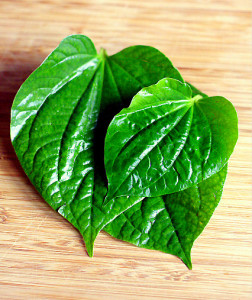Last week, the EU’s Rapid Alert System for Food and Feed’s (RSAFF) annual report came out with a warning of consistent Salmonella contamination in paan (betel) leaves from South-east Asian countries, advising a ban on imports from Bangladesh and reinforced checks and restrictions on imports from Thailand and India.
 Betel leaves are part of an important and symbolic tradition in many countries such as India, Myanmar, Bangladesh, Nepal, Sri Lanka and Vietnam, among others. The leaves are chewed together in a wrapped preparation called paan, with or without the areca nut (which acts as a stimulant widely believed to be carcinogenic), mineral slaked lime (which aids sublingual absorption) and flavouring substances such as kaththa, saunf (fennel) and gulkand. Sometimes tobacco is added as well. Panwadis dot every nook and corner of big and small towns, and many paan shops such as Prince Paan and Yamu’s Panchayat in New Delhi, have become celebrity favourites and household names. Fertile soil, proper shade and regular irrigation is required to grow betel leaves, and it makes up an important part of the economy in rural India and Bangladesh, fetching significant export revenues from the large Asian populations settled in the West.
Betel leaves are part of an important and symbolic tradition in many countries such as India, Myanmar, Bangladesh, Nepal, Sri Lanka and Vietnam, among others. The leaves are chewed together in a wrapped preparation called paan, with or without the areca nut (which acts as a stimulant widely believed to be carcinogenic), mineral slaked lime (which aids sublingual absorption) and flavouring substances such as kaththa, saunf (fennel) and gulkand. Sometimes tobacco is added as well. Panwadis dot every nook and corner of big and small towns, and many paan shops such as Prince Paan and Yamu’s Panchayat in New Delhi, have become celebrity favourites and household names. Fertile soil, proper shade and regular irrigation is required to grow betel leaves, and it makes up an important part of the economy in rural India and Bangladesh, fetching significant export revenues from the large Asian populations settled in the West.
According to S P Byotra, chairman of the department of medicine, Ganga Ram Hospital, New Delhi, the fact that export quality produce that is technically considered superior to local produce is being rejected by EU only highlights the magnitude of the problem in India.
paan isn’t composed of healthy ingredients to begin with. Sweet flavoured paans offer a great medium for the growth and survival of salmonella as well as amoeba. The kaththa and chuna, if stale, can become toxic and irritate the mouth. Betel leaves that are kept uncovered can be infected by salmonella and other bacteria. The areca nut is harmful for teeth, mucosa of the mouth, and is also considered carcinogenic. Chewing paan puts you at risk of contracting cancers of the stomach, mouth, esophagus, pancreas and kidney. The novel range of flavoured paans (such as strawberry, rose, khas, jasmine, mint among various others) are devoid of tobacco and areca nut, and are sold primarily as tasty mouth fresheners and carry fewer chances of any adverse effects.
